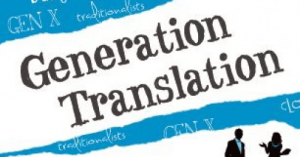 Since OKA started writing, training and consulting on generational issues in 2008, I’ve noticed a constant, and at times urgent, request to focus on Millennials (folks born between 1981 and 2000) and the need for specific tools and techniques to deal with the challenges that this large and demanding group poses to the other generations (all older) that make up today’s workforce. I have found that most of the Millennial issues are variations on a few themes that come up again and again. Knowing these key areas prepares you—regardless of your generation, for the challenges most likely to surface in workplaces where Millennials have joined the ranks, which at this point, is all of them. Given that the oldest Millennial (in 2020) is 39 and the youngest is about 20, there are few organizations that do not have a large contingent of this dynamic group. So what’s all the fuss about? Well, here are the Millennial Big 5.
Since OKA started writing, training and consulting on generational issues in 2008, I’ve noticed a constant, and at times urgent, request to focus on Millennials (folks born between 1981 and 2000) and the need for specific tools and techniques to deal with the challenges that this large and demanding group poses to the other generations (all older) that make up today’s workforce. I have found that most of the Millennial issues are variations on a few themes that come up again and again. Knowing these key areas prepares you—regardless of your generation, for the challenges most likely to surface in workplaces where Millennials have joined the ranks, which at this point, is all of them. Given that the oldest Millennial (in 2020) is 39 and the youngest is about 20, there are few organizations that do not have a large contingent of this dynamic group. So what’s all the fuss about? Well, here are the Millennial Big 5.
-
Access to Power
Most Millennials were the recipients of intense and consistent parental and institutional (teachers, coaches, et cetera) attention and support. Family life for many of this generation included frequent and routine family engagements and activities, so whereas past generations often felt (and expected) a certain personal and relational distance from the parental authorities in their lives, Millennials grew up with more attention, support and supervision that any other living generation had experienced. As a result, as adults in the workplace, this generation tends to expect open access to leadership and authority–open doors, inclusion and leaders who are responsive–even eager to hear from them and about their needs.
While the presumption of access to power and direct supervisory engagement strikes the other generations as entitled (and even arrogant), Millennials can be taken aback by the criticism. Many in this group have not experienced a world in which authorities (parents, teachers, coaches, et cetera) were not there to serve and support their success and happiness. As a result, Millennials have a belief that they should and do have access to an organization’s power players and decision makers.
-
Access to Information

Similarly, Millennials have always had access to data—a world of data—just a few taps or key strokes away. Hundreds of television channels, many of which were programmed specifically for the Millennial viewer, streaming and satellite radio, YouTube and downloadable music have put any and all music (for free) in the hands of anyone who cares to hear it at any time. Online connectivity and the tools we use within it—Google, Wikipedia and the like–have put limitless amounts of information in the hands of anyone who is plugged in. While all generations have access to these wonders, Millennials are digital natives; they do not remember a world when these online platforms were not central to our functioning and our societal infrastructure, and as such, Millennials tend to expect answers, data and information to come quickly and easily.
Closed doors, restricted access, barriers to information, operating on a “need to know” basis—these are challenging concepts to most Millennials, who expect data and digital connectivity to be constant, fast and free. This attitude only adds to the outside view that these twenty and young thirty-somethings are entitled.
-
Source of Knowledge (found or earned)
Related to the access to information, is the question of where and how knowledge is acquired. Roughly stated, Boomers (born between 1946 and 1964) believe real knowledge is something earned through experience, trial and error and ongoing challenge (successes and failures). As such, this powerful group (most organizations currently have largely Boomer leadership) values experience, tenure and the knowledge that is gained by time spent engaging life’s struggles.
Millennials, on the other hand—given this life-long access to quick data and easy answers—see knowledge as what is known, which means that knowledge is attainable instantly by anyone who can Google a question. Knowing how to change a tire from a YouTube video makes me as knowledgeable as someone who has actually changed tires for many years. To most Millennials, knowing is knowing.
While other generations can (and often do) regard this Millennial attitude as lazy, expectant and/or short-sighted, most Millennials believe the trait reflects a practicality and an orientation to both efficiency and speed. Why get bogged down in a repetitive task or toil to find an answer when I can learn or discover it online or by your merely telling me? This frees us both up to do more, faster.
-
Role of Technology and Personal Devices
Millennials are the first generation that cannot remember a world without internet connectivity and personal hand-held electronics. As such, this group tends to treat their phones and pads like appendages. In fact, many Millennials feel strongly that they are more effective and efficient with their technology than without it.
 Millennials who are told that it is rude or selfish to carry on a conversation with someone while holding (and checking) their hand-held device often reply that they are connected virtually with many people and groups (through Facebook, LinkedIn, Instagram, Snapchat, IMs, email, et cetera), and what is rude is your insistence that all of their relationships and concurrent activities cease because they are talking to you. Expecting that degree of focus and exclusivity, from this view, is selfish and rude.
Millennials who are told that it is rude or selfish to carry on a conversation with someone while holding (and checking) their hand-held device often reply that they are connected virtually with many people and groups (through Facebook, LinkedIn, Instagram, Snapchat, IMs, email, et cetera), and what is rude is your insistence that all of their relationships and concurrent activities cease because they are talking to you. Expecting that degree of focus and exclusivity, from this view, is selfish and rude.
-
Speed of Advancement
Millennials have had consistent access to power and information, and they are unarguably the most educated generation to ever hit the job market, and all of these qualities and experiences have come together to push this generation to expect speed, access and professional advancement quickly. Common is the story of the Millennial frustrated with the slow pace at which he or she is moving through the ranks at work. “I’ve been here almost a year, and I have not been promoted or been given a raise!”
The speed at which Millennials expect advancement—while understandable from within this unique world view—only exacerbates the sense of privilege and arrogance that other generations often associate with these twenty and early thirty somethings.
So what now?
 OKA’s Generation Translation: Tools for Bridging the Gap, authored by OKA’s Hile Rutledge and Rita M. Murray Ph.D., is both an interactive workbook on the topic of generations that can stand-alone as a source of learning and suggested next steps as well as a support tool for interactive generational training. The point of both the book and the public training is to bring generational understanding to leaders, teams and workplaces—learning not just what people do and why they think differently, but what to do about these generational gaps–the action steps that bring not just greater efficiency but appreciation. What do you say to and how do you treat each generation to access their positive qualities—of which there are many—and how do you avoid the landmines common to their specific world view?
OKA’s Generation Translation: Tools for Bridging the Gap, authored by OKA’s Hile Rutledge and Rita M. Murray Ph.D., is both an interactive workbook on the topic of generations that can stand-alone as a source of learning and suggested next steps as well as a support tool for interactive generational training. The point of both the book and the public training is to bring generational understanding to leaders, teams and workplaces—learning not just what people do and why they think differently, but what to do about these generational gaps–the action steps that bring not just greater efficiency but appreciation. What do you say to and how do you treat each generation to access their positive qualities—of which there are many—and how do you avoid the landmines common to their specific world view?

To me, what’s missing in the bridge between these two generations is inter-generational respect or appreciation for how we learn through the decades and through the epochs of technology. I’m a Boomer. I learned many things by doing them, thus “learning a trade” was popular as I created my career.
If a Millennial learns how to change a tire successfully by watching a YouTube video….cool. But they can’t summarily dismiss how I had to learn to do it when there was no YouTube.
Re: social graces like having a conversation with someone in person – Become intergenerational ! You can Tweet, chat, blog, and email your fellow Millennials all you want, we understand that’s the best you can do together. But in order to get along with the other half of society become bi-lingual – learn to carry on a conversation in order to connect with someone other than yourself. e.g.Learn to write a thank you note. Now there’s a concept. Learn to take interest in some things other people are doing. Learn to ask good questions of others so you learn about their values, their work, hobbies, or concerns in life.
HIle –GREATA article! Thanks for putting this together.
Excellent article, capturing much of what makes the millennials “tick.”
My family has 5 generations living nearby and the article rings true for the ones now just entering their careers. Further it helps those of other generations understand some of the customs and practices that jar and confound us. This understanding is essential in business for just as the Civic WWII generation gave way to us Boomers, so we’ve moved aside for Generation X, who are beginning to manage the emerging Millennials. Very nice perspective.